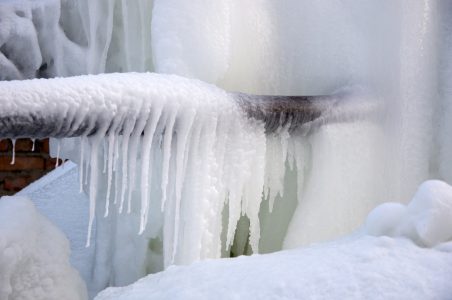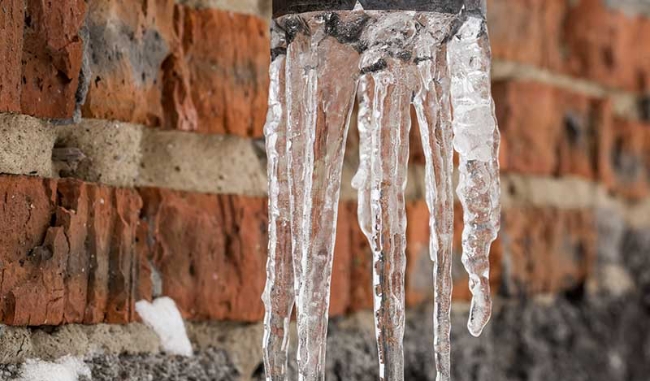Here underneath you can discover a good deal of sensible additional info in regards to Winter Plumbing Precautions: Preventing Frozen Pipes.

Cold weather can wreak havoc on your pipes, specifically by freezing pipelines. Right here's how to stop it from occurring and what to do if it does.
Introduction
As temperatures decline, the danger of icy pipelines increases, possibly causing costly fixings and water damage. Recognizing exactly how to prevent frozen pipelines is important for homeowners in chilly climates.
Prevention Tips
Shielding at risk pipes
Wrap pipes in insulation sleeves or use heat tape to safeguard them from freezing temperatures. Focus on pipes in unheated or outside areas of the home.
Heating techniques
Keep interior rooms adequately heated, especially locations with pipes. Open cabinet doors to allow cozy air to flow around pipes under sinks.
How to identify icy pipes
Look for reduced water circulation from taps, uncommon smells or noises from pipelines, and visible frost on subjected pipes.
Long-Term Solutions
Architectural changes
Think about rerouting pipes far from exterior wall surfaces or unheated areas. Include extra insulation to attic rooms, basements, and crawl spaces.
Updating insulation
Invest in high-quality insulation for pipelines, attic rooms, and walls. Correct insulation helps preserve consistent temperatures and lowers the risk of icy pipelines.
Safeguarding Outside Pipes
Garden hose pipes and exterior taps
Disconnect and drain yard tubes prior to winter season. Set up frost-proof faucets or cover exterior taps with insulated caps.
Understanding Frozen Pipes
What triggers pipes to ice up?
Pipelines freeze when subjected to temperature levels listed below 32 ° F (0 ° C) for prolonged periods. As water inside the pipes freezes, it expands, putting pressure on the pipe walls and possibly causing them to burst.
Risks and problems
Icy pipelines can result in water system interruptions, residential property damage, and expensive repairs. Ruptured pipes can flood homes and create substantial structural damages.
Indications of Frozen Pipes
Recognizing frozen pipelines early can avoid them from bursting.
What to Do If Your Pipelines Freeze
Immediate actions to take
If you believe frozen pipes, maintain faucets available to soothe pressure as the ice thaws. Make use of a hairdryer or towels taken in hot water to thaw pipes gradually.
Verdict
Avoiding icy pipelines needs positive actions and fast reactions. By understanding the reasons, signs, and safety nets, property owners can shield their plumbing throughout cold weather.
Helpful Tips to Prevent Frozen Pipes this Winter
UNDERSTANDING THE BASICS: WHY PIPES FREEZE AND WHY IT’S A PROBLEM
Water freezing inside pipes is common during the winter months, but understanding why pipes freeze, and the potential problems it can cause is crucial in preventing such incidents. This section will delve into the basics of why pipes freeze and the associated problems that may arise.
THE SCIENCE BEHIND FROZEN PIPES
When water reaches freezing temperatures, it undergoes a physical transformation and solidifies into ice. This expansion of water as it freezes is the primary reason pipes can burst. As the water inside the pipe freezes, it expands, creating immense pressure on the walls. If the pressure becomes too great, the pipe can crack or rupture, leading to leaks and water damage.
FACTORS THAT CONTRIBUTE TO PIPE FREEZING
Low Temperatures: Extremely cold weather, especially below freezing, increases the risk of pipes freezing. Uninsulated or Poorly Insulated Pipes: Pipes located in unheated areas, such as basements, crawl spaces, or attics, are more prone to freezing. Insufficient insulation or lack of insulation altogether exacerbates the problem. Exterior Wall Exposure: Pipes running along exterior walls are susceptible to freezing as they encounter colder temperatures outside. Lack of Heating or Temperature Regulation: Inadequate heating or inconsistent temperature control in your home can contribute to frozen pipes. PROBLEMS CAUSED BY FROZEN PIPES
- Pipe Bursting: As mentioned earlier, the expansion of water as it freezes can cause pipes to burst, resulting in significant water damage.
- Water Damage: When pipes burst, it can lead to flooding and water damage to your property, including walls, ceilings, flooring, and personal belongings.
- Structural Damage: Prolonged exposure to water from burst pipes can compromise the structural integrity of your home, leading to costly repairs.
- Mold and Mildew Growth: Excess moisture from water damage can create a favorable environment for mold and mildew growth, posing health risks to occupants.
- Disrupted Water Supply: Frozen pipes can also result in a complete or partial loss of water supply until the issue is resolved.
WHY CERTAIN PIPES ARE MORE PRONE TO FREEZING
- Location: Pipes located in unheated or poorly insulated areas, such as basements, crawl spaces, attics, or exterior walls, are at higher risk of freezing.
- Exterior Pipes: Outdoor pipes, such as those used for irrigation or exposed plumbing, are particularly vulnerable to freezing as they are directly exposed to the elements.
- Supply Lines: Pipes that carry water from the main water supply into your home, including the main water line, are critical to protect as freezing in these lines can affect your entire plumbing system.
- Underground Pipes: Pipes buried underground, such as those connected to sprinkler systems or outdoor faucets, can be susceptible to freezing if not properly insulated.
https://busybusy.com/blog/helpful-tips-to-prevent-frozen-pipes-this-winter/

We had been shown that write-up on Prevent Frozen Pipes from a pal on another web address. Enjoyed reading our blog posting? Please share it. Help others find it. I praise you for being here. Return soon.
Rates